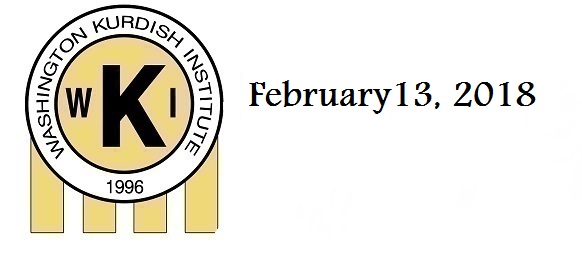895
Iran
- The most recent quarterly report from the inspector general for the U.S. mission to Iraq and Syria revealed that U.S.-made M1 Abrams tanks ended up in the hands of pro-Iranian militias. According to the report, “this quarter, the [Department of State] acknowledged that some U.S.-provided military equipment sent to support the mission, including as many as nine M1 Abrams tanks, had fallen into the hands of Iranian-backed militias that fought against ISIS in Iraq.” The report goes on to say that the Department of State “pressed the Iraqi government to prioritize the return of defense articles provided by the United States as designated in the sale agreements.” On October 16, 2017 the aforementioned Iranian-backed militias used these American-made weapons to attack Kurdistan region forces in the territories disputed between the Kurdistan Regional Government and the Federal Government of Iraq.
- A Kolbar, or Kurdish border worker, was killed in a border village near Baneh. The Kurdish worker, Shwana Rasouli, was found dead with his hands and legs tied, according to the Kurdistan Human Rights Association. In 2018, more than 15 Kurdish border workers have been killed by the Iranian regime while transferring goods for Iranian businessmen between Iraqi Kurdistan and Iran.
Iraq
- On February 8, unknown gunmen opened fire on a group of Kurdish youth in front of a store in Khanaqin-Diyala Province. The shooting resulted in the death of seven Kurds and the injury of four others. Local police have begun investigating but have no indication yet of who the perpetrators may be or their motive. After October 16, 2017 Iraqi militias and Federal police took over security in Khanaqin after the Kurdish security forces withdrew. Khanaqin is one of the disputed towns between Baghdad and Erbil.
- The Iraqi government will begin auditing the employee lists of the Kurdistan Region as a first step before releasing their salaries. KRG Deputy Prime Minister Qubad Talabani said that the KRG’s new biometric system will make the audit process easier. Talabani also said that he hoped that the audit would be implemented for all departments throughout the larger Iraqi central government. On February 12, angry teachers in Sulaymaniyah protested the government for its long delay in paying their salaries. Meanwhile, both international airports in Arbil and Sulaymaniyah remain closed by the central government in the aftermath of the Kurdistan region’s independence referendum, which was held on September 25, 2017.
- The main political parties in the Kurdistan region are in the final stages of announcing their candidates for the upcoming Iraqi parliamentary elections. These political parties are divided into several election lists, while there has been talks that they all may participate in the disputed territories as a single bloc.
- After a visit to Baghdad to meet Iraq’s foreign minister, the French Foreign Minister Jean-Yves Le Drian visited the Kurdistan region and met with KRG Prime Minister Nechirvan Barzani. In a statement released after the meeting, the KRG said that Mr. Le Drian reiterated that the talks between the KRG and the Iraqi Federal Government should be based on the constitution and expressed France’s commitment to both sides in reaching a mutually beneficial agreement.
Syria
- Turkey’s Invasion of Afrin: Turkish airstrikes and artillery bombardments continued on several fronts in the Afrin region. On February 12, the-U.S. backed Syrian Democratic Forces (SDF) released a war sheet that dated from the beginning of the invasion. According to the SDF war sheet, 180 civilians have been killed and 413 have been injured with Turkey undertaking 668 airstrikes on the region. The SDF announced the death of 98 of their fighters and 862 fighters from the jihadi groups and Turkish forces. In the past week, the SDF shot down two Turkish war helicopters and one Unmanned Aerial Vehicle (UAV). On February 11, the Turkish armed forces announced the death of 31 Turkish soldiers and 143 wounded since the military campaign against Afrin started. U.S. Secretary of State Rex Tillerson will visit Turkey after relations between the two countries continue to deteriorate because of Turkey’s policies in Syria and the Afrin invasion. U.S. Defense Secretary James Mattis said that the Turkish operation is drawing off anti-ISIS forces. On February 12, the Turkish Prime Minister said “we don’t need anybody’s permission to do that [i.e., invade Afrin].” He also hinted that Turkey may begin attacking Manbij where U.S. forces are based and have refused to pull out despite continual Turkish demands. Meanwhile, the French Foreign Minister warned Turkey over its targeting and killing of civilians. Activists in Europe and the U.S. continue to hold rallies to pressure the international community to intervene and stop Turkey’s aggression.
- After 8 years of failed peace talks in Syria, a new plan was announced by Turkey’s President Recep Tayyip Erdogan which will include three-way talks over Syria in Istanbul, Turkey. The new round of peace talks will be a continuation of the recent failed peace talks at the Sochi resort in Russia. The talks will include the leaders of Russia, Turkey, and Iran.
Turkey
- The Pro-Kurdish Peoples’ Democratic Party (HDP) held its 3rd Congress to elect new co-chairs. With 823 delegate votes, Ms. Pervin Buldan and Mr. Sezai Temelli were elected as the new Co-chairs of the HDP. Former Co-chair Selahattin Demirtas sent a letter from his jail to the party members congratulating them. The letter said that the “HDP is now a permanent political institution and has become one of Turkey’s main political line.” Soon after the HDP Congress ended, the Turkish government launched an investigation into remarks by the newly elected leaders. Prior to the HDP Congress, the Turkish police arrested a number of HDP members, including 20 members in Gebze, Kocaeli Province. The police also arrested the co-chair of the Democratic Regions Party (DBP) Mehmet Arslan.

